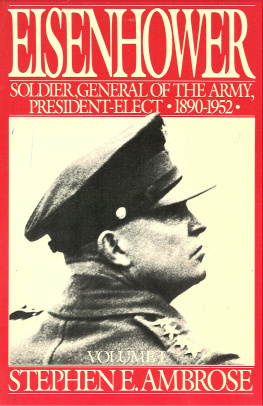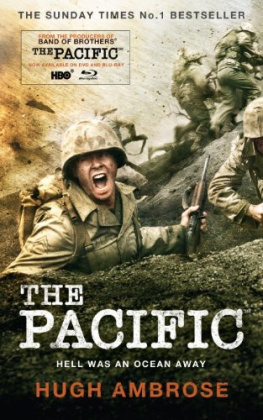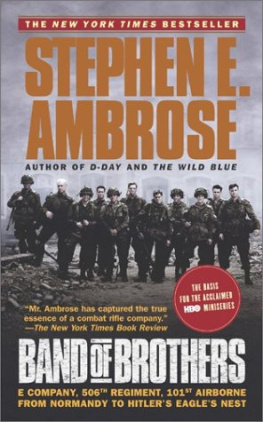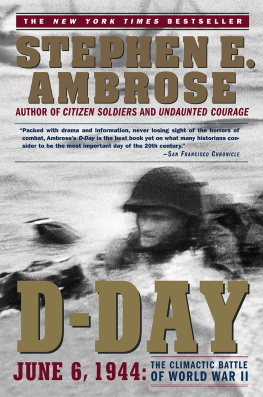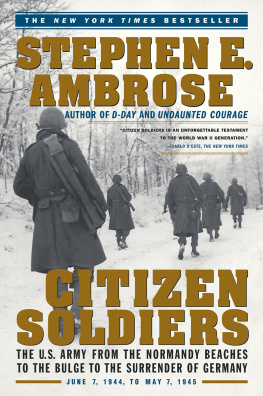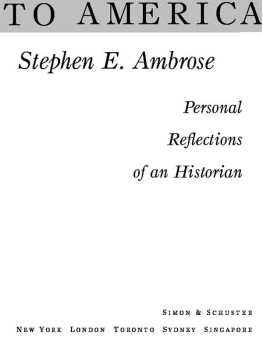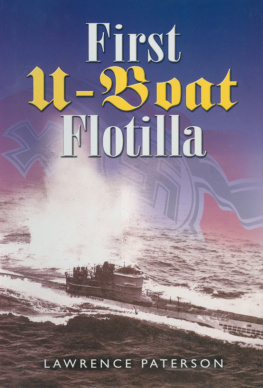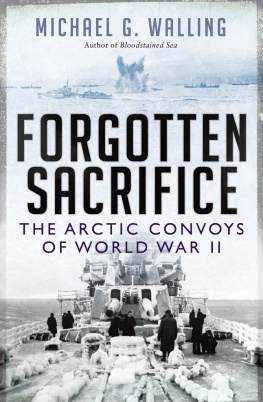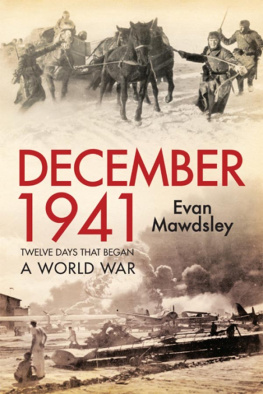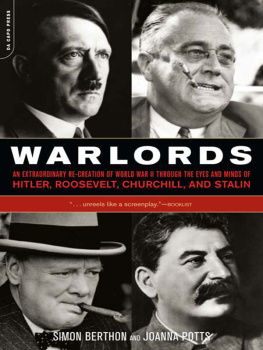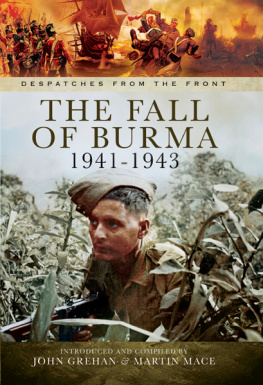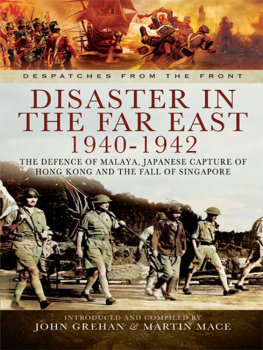We hope you enjoyed reading this Simon & Schuster eBook.
Join our mailing list and get updates on new releases, deals, bonus content and other great books from Simon & Schuster.
C LICK H ERE T O S IGN U P
or visit us online to sign up at
eBookNews.SimonandSchuster.com
Thank you for downloading this Simon & Schuster eBook.
Join our mailing list and get updates on new releases, deals, bonus content and other great books from Simon & Schuster.
C LICK H ERE T O S IGN U P
or visit us online to sign up at
eBookNews.SimonandSchuster.com
A LSO BY S TEPHEN E. A MBROSE
Ikes Spies:
Eisenhower and the Espionage Establishment
Rise to Globalism:
American Foreign Policy 19381970
Crazy Horse and Custer:
The Parallel Lives of Two American Warriors
Eisenhower and Berlin, 1945
Duty, Honor, Country:
A History of West Point
The Supreme Commander:
The War Years of General Dwight D. Eisenhower
For Moira with love
CONTENTS

FOREWORD

D WIGHT E ISENHOWER was a great and good man. He was one of the outstanding leaders of the Western world of this century. As a soldier he was, as George C. Marshall said at the end of the war, everything that the U.S. Army hoped for in its finest productsprofessionally competent, well versed in the history of war, decisive, well disciplined, courageous, dedicated, and popular with his men, his subordinates, and his superiors. His leadership qualities also included a high degree of intelligence, integrity, commitment to basic principles, dignity, organizational genius, tremendous energy, and diplomatic ability. As a man, he was good-looking, considerate of and concerned about others, loyal to his friends and family, given to terrible rages (which he learned to control), ambitious, thin-skinned and sensitive to criticism, stubborn and inflexible about his habits, an avid sportsman and sports fan, modest (but never falsely so), almost embarrassingly unsophisticated in his musical, artistic, and literary tastes, intensely curious about people and places, often refreshingly nave, fun-lovingin short, a wonderful man to know or be around. Nearly everyone who knew him liked him immensely, manyincluding some of the most powerful men in the worldto the point of adulation.
This is a biography of that man. It is not a study of his life and times. The distinction between the two types of books is, I think, clear. A biography concentrates on the man, his achievements, triumphs, disappointments, failures, and concerns. It is more interested in what he felt and experienced and thought than it is with the events of his lifetime. Biography takes its cue from the man himself; what was important to him is what is important to his biographer. What follows, then, is less a study of the Supreme Commander, or the Chief of Staff, or the president of Columbia University, or the presidential candidate, than it is a study of Dwight Eisenhower.
To be specific, in an earlier study of Eisenhower during the war, I was concerned with the role of the Supreme Commanderwhat he did, and why, with what results, within the context of the vast organization he commanded. In that work, there is a great deal of detail about his staff, his plans, his operations, his superiors, his decisions as Supreme Commander, and almost nothing about his personal life. For example, his wifes name appeared but four times in that books 732 pages, his sons name only six times, and Kay Summersbys name but once. These people were of almost no importance to his actions as the Supreme Commander. But they were of central importance to Dwight Eisenhower the manhe thought about them, worried about them, corresponded with them at length, and looked to them as the sustaining force that made it possible for him to bear his great burdens. Thus their names, their activities, and their relationship with Eisenhower are one of the main features of this book.
The point of view throughout is Eisenhowers; the concentration is on the issues, people, events, and developments that he concentrated upon. I limit the perspective to what he knew, about his enemies, his friends, his superiors, and his subordinates. I am greatly concerned with what his appreciation was of Hitlers, Rundstedts, and Rommels situation and intentions from 1942 to May 1945; I seldom undertake an analysis of what their actual situation and intentions were. In the same way, I attempt to understand and describe his appreciation of Stalins situation and intentions in the period May 1945November 1952, without attempting any deep analysis of how right or wrong he was about the scope and nature of the Communist threat.
In a previous work,fact a defensive policy designed to protect the security of the Soviet Union. But such speculative analysis does not, in my view, belong in a biography. What Eisenhower thought, and why he thought it, does belong.
The vast majority of citations in this book are from Eisenhowers own wordshis personal letters, his directives, his memorandums, his diary entries, his telegrams and cables, his speeches, his memoirs, and his statements in dozens of interviews from 1962 to 1969. Only occasionally do I yield to the temptation to second-guess his decisions, and even then I almost always do so within the context of his own, later, self-criticism.
It is not my primary task, as I see it, to judge the man, but rather to explain and describe him. In the process, I hope that I convey some sense of what a truly extraordinary person he was, andto indulge in one additional judgmentof how much all of us who live in freedom today owe to him.
. The Supreme Commander: The War Years of General Dwight D. Eisenhower (Garden City, N.Y.: Doubleday & Co., 1970).
. Rise to Globalism: American Foreign Policy Since 1938 (London and New York: Penguin, 1972).
CHAPTER ONE

Pennsylvania, Texas, Kansas
17411900
H IS HERITAGE was ordinary, his parents were humble folk, his childhood was typical of thousands of other youngsters growing up around the turn of the century, and most of his career was humdrum and unrewarded. On the surface, everything about him appeared to be average. Had he died in 1941, on the verge of retirement on his fifty-first birthday, he would not today be even a footnote to history.
Yet Dwight Eisenhower was born to command and became one of the great captains of military history. He was also born to lead, and although he was sixty-one years old before he stood for public office, he became one of the most successful Presidents of the twentieth century.
Eisenhower was born in the year the American frontier came to an end. He died in the year that man walked on the moon. In his lifetime, the pace of technological change was breathtaking, but hardly more so than the changes in American and world politics. Only a handful of menLenin, Stalin, Hitler, Mao, Churchill, Wilson, Franklin Roosevelt, and perhaps one or two morehad a greater role than he did in shaping the world of the mid-twentieth century. For the two decades from 1941 to 1961, Eisenhower played a central and crucial role in world events. He was the victorious general who, after the greatest war in history, led his people on the path of peace.
Next page
